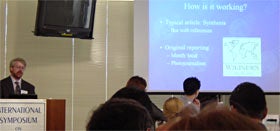April 8, 2005 | Citizen Journalism, Featured
Audience Writes the News at Wikinews

on Apr. 8, 2005.(Knight Center/Flickr)
Wayne Saewyc spoke Friday about Wikinews, an online news site that offers a unique way for viewers to edit any content on its website.
The keyword of Saewyc’s presentation was “community,” emphasizing the idea that it is the readers who decide what appears on Wikinews. “It’s about the community and how we work together and get things done,” Saewyc said.
Saewyc is the editor of the five-month-old project, which offers free news and strives to be an alternative to commercial news, according to the Wikinews website. Wikinews allows readers to post new articles or edit already published articles.
“As soon as they see an error they can reach in there and fix it,” Saewyc said.
Wikinews has more than 4,000 registered users and is produced in 12 different languages, including Spanish, German, and Italian. It is a product of the Wikimedia Foundation which also controls seven other projects including Wiktionary, a multilingual dictionary, and Wikipedia, an interactive encyclopedia.
Most articles posted on Wikinews are summaries of other articles users have gathered about a subject they are interested in, said Saewyc. There is some original reporting also, most of which tends to focus on the writer’s neighborhood.
Saewyc also spoke about the issue of credibility on a site that is open for anyone to edit.
When Wikinews first launched, editors spent time to fact check and make sure that the articles were accurate. However, when a tsunami hit Asia in December 2004, the site received more than 200 edits a minute, Saewyc said. The editors couldn’t keep up with the posts, so Wikinews began publishing articles before fact checking them. “The more people that are seeing the articles, the more they get edited,” Saewyc said.
Wikinews is still a beta project, meaning that it is still being developed, Saewyc said. Currently they are looking for a licensing company.
ISOJ 2005: Participatory Journalism in Action, from Knight Center on Vimeo.

